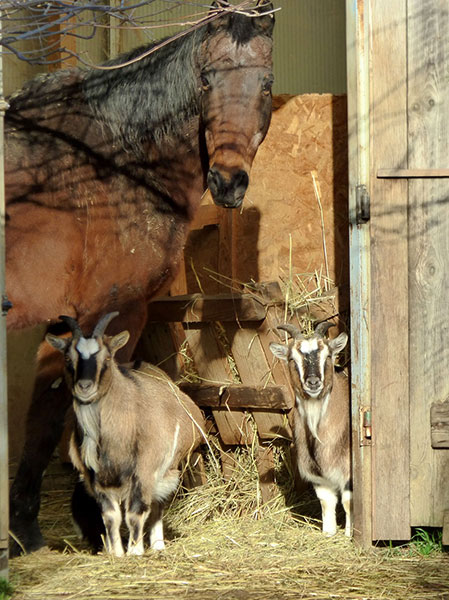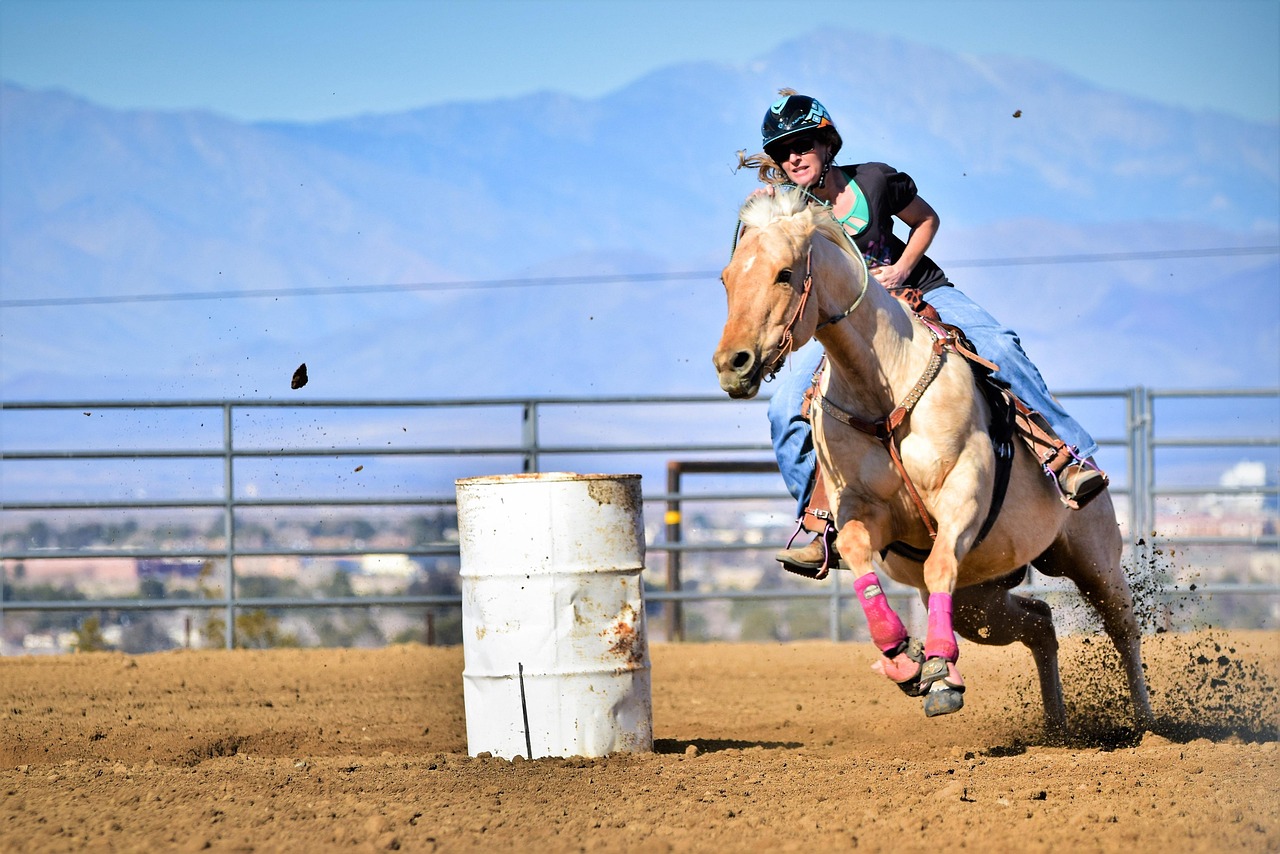
Goats are used as companions for horses primarily because of their calming presence, herd instincts, and cost-effectiveness compared to other horses. This practice is common in racehorse stables, where highly-strung and nervous horses can benefit from a goat's soothing company.
In fact, the phase, “Getting someone’s goat” is known to have racehorse roots!
One widely circulated story suggests that trainers would place a goat in the stall of a high-strung racehorse to keep it calm before a big race. Opposing trainers would sometimes steal the goat, hoping to upset the horse and cause it to perform poorly.
"Getting someone's goat," in this sense, meant intentionally causing a person or animal distress.
While often successful, using goats as horse companions is not without risks.
We’ve seen many horses who welcomed a goat in their lives and it’s a way for a lonely or nervous horse to have some calm company!
You can find more informative articles in our section on Recreation & Lifestyle. Take a look at our Curated Amazon Store for our selections in a wide variety of categories!
Teresa Kackart will demonstrate on how to catch a horse safely in a stall.
For more information on the largest certifying body of riding instructors and barn managers in North America, please visit Certified Horsemanship Association to find a certified equine professional or accredited equine facility near you.

The American Quarter Horse is considered the most popular horse breed due to its extraordinary versatility, calm temperament, and historic role in the American West. These horses excel in a wide range of activities, from demanding ranch work and high-speed rodeo events to recreational trail riding and show competitions, making it a reliable and adaptable horse for both professional and family use. The American Quarter Horse Association (AQHA), which is the world's largest equine breed registry, has registered over six million horses since 1940.
American Quarter Horses are "all-rounders" that can excel in a wide array of disciplines, making them a practical choice for many owners.
Quarter Horses are known for their gentle and easygoing disposition, making them suitable for riders of all skill levels. This cooperative and intelligent nature makes them an ideal choice for a wide range of uses, from competitive show horses to quiet family companions.
The breed's long history is closely linked to the development of the United States.
The sheer numbers of registered Quarter Horses reflect the breed's popularity. As mentioned, the American Quarter Horse Association (AQHA) is the largest horse breed registry in the world, with over six million horses in its registry. This large community also contributes to the breed's continued growth and recognition through shows, events, and youth programs.
For all of these reasons, we love Quarter Horses too! Learn about more Horse Breeds on EIE.
You can find more informative articles in our section on Recreation & Lifestyle. Take a look at our Curated Amazon Store for our selections in a wide variety of categories!
Interested in promoting your business or sharing content on EIE? Contact us at info@equineinfoexchange.com

Kentucky’s horse racing legacy is built on a foundation of dedication, innovation, and a deep respect for the sport’s traditions. Across Lexington and Louisville, trainers, breeders, and stable hands are using cutting-edge technology to prepare young thoroughbreds for the Kentucky Derby while maintaining the craftsmanship that defines Bluegrass racing culture.
As Derby season approaches, the buzz around Kentucky’s top stables grows louder with every prep race. Fans following their favorite horses, from early workouts at Keeneland to qualifying runs at Churchill Downs, look for every way to feel part of the action.
For many, that excitement extends beyond the stands, with some taking advantage of the latest betting promos in Kentucky to make race day even more thrilling. It’s a tradition that blends the state’s passion for horse racing with a modern edge, keeping the spirit of competition alive from the barns to the betting slips.
Kentucky’s horse racing tradition stretches back over a century, yet its top trainers are embracing technological progress to stay ahead of the competition.
From the breeding farms of Lexington to the training grounds near Louisville, stable operations are merging long-standing practices with data science, allowing trainers to predict potential, prevent injury, and perfect performance. These advancements ensure that each young horse has every possible advantage before stepping onto the Derby trail.
Today’s top Kentucky trainers use motion-sensor tracking, heart-rate monitoring, and stride analysis software to collect real-time data during workouts. These tools allow teams to assess a horse’s efficiency, stamina, and stress response.
The collected data helps refine training regimens, ensuring each thoroughbred reaches peak performance while minimizing physical strain. What once relied solely on instinct and observation now benefits from precise, quantifiable insight.
Equine nutrition has evolved into a scientific discipline that influences every aspect of a horse’s growth, conditioning, and longevity. Kentucky-based nutritionists collaborate with stables to design individualized feeding plans based on a horse’s age, metabolism, and workload.
The introduction of micro-nutrient tracking and electrolyte recovery programs allows trainers to maintain optimal performance across longer training cycles without overexertion.
Modern Kentucky trainers are integrating technology into feeding management, using data to track caloric intake, hydration levels, and digestive health. Advanced supplement blends with amino acids, probiotics, and vitamin infusions have become standard for Derby-caliber horses.
These regimens balance traditional grain mixes with performance-enhancing nutrients, enabling horses to recover faster between demanding training sessions.
Early conditioning is one of the defining factors in determining a horse’s racing potential. Kentucky trainers begin structured programs months before formal track training begins. Controlled gallops, swimming sessions, and gradual speed conditioning are used to develop both cardiovascular strength and mental focus.
This early exposure to physical and sensory challenges builds horses that are resilient, confident, and ready for elite competition.
Biomechanical analysis tools now play a key role in conditioning programs. By studying gait symmetry, stride frequency, and joint flexion, trainers can make micro-adjustments that prevent long-term injuries. These insights provide a bridge between traditional horsemanship and modern sports science, ensuring that every stride brings the horse closer to its full athletic potential.
Prep races leading up to the Kentucky Derby offer a preview of the year’s most promising contenders. Trainers closely study sectional timing data, pace dynamics, and finishing acceleration to refine their horses’ strategies. The 2025 prep circuit at Churchill Downs, Fair Grounds, and Keeneland highlighted several emerging stars, each representing the effectiveness of modernized Kentucky training methods.
Recent prep races have shown a shift toward horses that combine endurance with tactical speed. Kentucky-based trainers emphasize efficient pacing and consistent stride length, using wearable tech to measure split times and heart-rate recovery post-race. These details reveal how advanced conditioning and technology are redefining Derby preparation, giving Kentucky stables an edge in national competition.
Lexington’s reputation as the heart of horse breeding remains unmatched. Farms like Claiborne, Spendthrift, and Ashford continue to set industry standards, blending old-world expertise with innovation.
Facilities here are equipped with hydrotherapy pools, climate-controlled stalls, and digital monitoring systems, all designed to support year-round conditioning and performance optimization.
Breeding operations around Lexington are adopting artificial intelligence to analyze bloodlines and predict genetic strengths. AI algorithms process decades of racing and breeding data, identifying ideal pairings to maximize speed, stamina, and temperament. This integration of science into breeding ensures that the next generation of Kentucky-bred horses inherits the best possible combination of athletic traits.
Louisville remains the beating heart of Derby tradition. Trainers based near Churchill Downs focus on acclimating young horses to the track’s unique conditions, from the sound of the crowd to the texture of the dirt surface. Many incorporate simulated race scenarios to build confidence and adaptability in their horses, ensuring readiness for the high-pressure environment of Derby Day.
Using advanced audio systems and visual stimuli, Louisville trainers replicate race-day noise, movement, and competition to condition horses psychologically. This desensitization method enhances focus during real races, where unpredictable energy levels and crowd intensity can affect performance. It is an innovation rooted in Kentucky’s tradition of precise preparation and poise under pressure.
The Kentucky Derby is not only the pinnacle of horse racing but also a major economic driver for the state. The influx of visitors during Derby week supports thousands of jobs in hospitality, retail, and event management. Lexington and Louisville see record occupancy rates, with hotels, restaurants, and small businesses benefitting from the surge in tourism and fan engagement.
Local artisans, distilleries, and restaurants experience a remarkable boost in revenue during Derby season. Shops selling equestrian gear and Derby hats often record their highest annual sales in the weeks leading up to the race. The economic ecosystem surrounding the Derby illustrates how the passion for racing extends beyond the track, strengthening Kentucky’s cultural and financial identity.
The digital age has expanded horse racing’s audience beyond the grandstands. Fans across Kentucky stay connected to the sport through mobile apps, streaming services, and interactive platforms. Online communities and race analytics tools allow enthusiasts to follow their favorite horses throughout the year, deepening their connection to the state’s racing heritage.
Apps and live-streaming platforms have revolutionized how fans track results from Churchill Downs, Keeneland, and other circuits. Many platforms now provide race replays, training videos, and betting insights in real time. This accessibility keeps engagement strong between major events, sustaining enthusiasm and community involvement throughout the off-season.
Kentucky’s racing future depends on training not just horses but people. Equine programs at the University of Kentucky and other local institutions offer hands-on training in equine science, nutrition, and management. These programs ensure that the state continues producing skilled professionals capable of balancing tradition with innovation.
Leading trainers often mentor young assistants and stable hands, passing down the expertise that has defined Kentucky’s racing culture. This blend of academic education and real-world experience creates a well-rounded generation of horsemen ready to sustain Kentucky’s legacy at the forefront of the sport.
Environmental stewardship is becoming an essential part of Kentucky’s racing operations. Stables and farms are adopting green technologies, including solar-powered barns, water recycling systems, and organic pasture management. These initiatives reflect a broader effort to protect the land that sustains the thoroughbred industry.
Facilities are now incorporating biodegradable bedding materials, efficient ventilation systems, and renewable energy sources. Trainers and farm owners recognize that maintaining environmental balance ensures the longevity of Kentucky’s racing ecosystem. These sustainability efforts exemplify the forward-thinking mindset shaping the future of the industry.
Kentucky’s ability to adapt and evolve is what keeps it ahead of the curve. The combination of world-class training, advanced technology, and a deeply rooted culture of horsemanship positions the state as the undisputed leader in American racing. Every innovation introduced in Kentucky influences the broader national landscape of the sport.
As the sport continues to evolve, Kentucky’s commitment to progress ensures that its trainers, breeders, and horses will remain at the center of excellence. The synthesis of tradition, technology, and talent forms the foundation upon which future Derby champions will rise, solidifying Kentucky’s enduring supremacy in the realm of thoroughbred racing.
There are more interesting articles in our section on Racing & Wagering.
Rood & Riddle Stallside Podcast
In this episode of StallSide, Dr. Sarah Thomas of Rood & Riddle Saratoga discusses common and often serious medical problems that can affect foals after their first month of life. Covering diarrhea, pneumonia, and other post-neonatal illnesses, Dr. Thomas explains the signs owners should watch for, diagnostic approaches, and treatment options to help ensure young horses stay on track for a healthy future.
Whether you’re a breeder, trainer, or horse owner, this conversation offers practical insights into protecting foal health beyond the newborn period.
Our Mission — Serving the professional horse person, amateur owners, occasional enthusiasts and sporting interests alike, the goal is to serve all disciplines – which often act independently yet have common needs and values.
Equine Info Exchange is totally comprehensive, supplying visitors with a world wide view and repository of information for every aspect related to horses. EIE provides the ability to search breeds, riding disciplines, horse sports, health, vacations, art, lifestyles…and so much more.
EIE strives to achieve as a source for content and education, as well as a transparent venue to share thoughts, ideas, and solutions. This responsibility also includes horse welfare, rescue and retirement, addressing the needs and concerns of all horse lovers around the world. We are proud to be a woman-owned business.